Israeli Couple Travels to U.S. for Life-Saving Treatment After Unborn Baby Diagnosed with Heart Failure: 'He's a Miracle'
“Every day it was a fight for his life,” the baby's father Yair Broyer tells PEOPLE exclusively
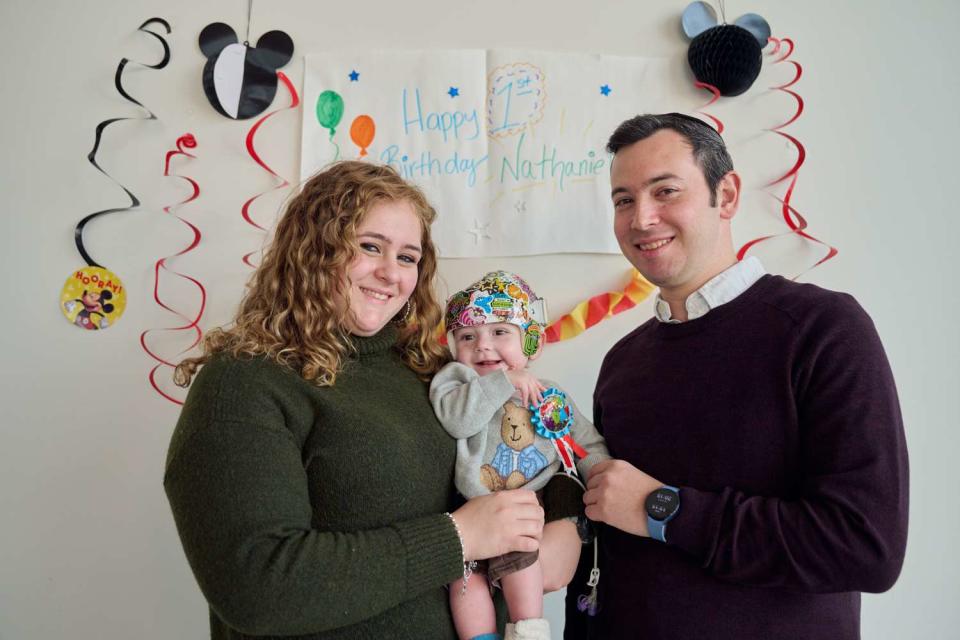
Joe Carrotta / Hassenfeld Children's Hospital at NYU Langone
Henya Grossman and Yair Broyer with their son Nathaniel on his first birthday in Nov. 2023.One year ago, Henya Grossman and Yair Broyer were told by doctors in their homeland of Israel that their unborn baby would not survive. But just two weeks ago, their son, Nathaniel Grossman, defied all the odds by celebrating his first birthday.
It's been a long journey for the couple, who married in January 2020.
In December 2020, Grossman suffered a sudden, unexplained miscarriage when she was 22 weeks pregnant with their first child. The couple was elated to learn they were pregnant with their rainbow baby, Nathaniel, in 2021. But at a 23-week ultrasound, doctors noticed something looked wrong with his heart.
“I was shocked,” says Grossman, 23. “It was an absolutely normal pregnancy.”
At 27 weeks pregnant, Grossman and Broyer received the news that the growing fetus had severe heart failure. Doctors in Israel told the couple that their baby wouldn’t make it.
"I was afraid," Grossman tells PEOPLE. “I didn’t want to lose him."
Initially, Grossman was referred to a cardiologist who did a fetal echocardiogram. At first, she was told the baby looked healthy, but at a three-week follow-up appointment, she got a different report: "They told me nothing is okay,” Grossman recalls.
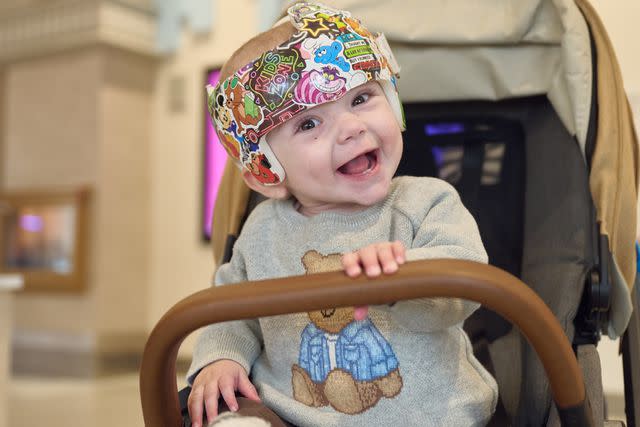
Joe Carrotta / Hassenfeld Children's Hospital at NYU Langone
Nathaniel Grossman on his first birthday.Soon her unborn son was diagnosed with severe heart failure from life-threatening dilated cardiomyopathy. The baby had a severely weakened left ventricle, the heart chamber that pumps oxygenated blood throughout the body.
Doctors in Israel told the couple that there was nothing they could do. The baby would likely not survive the pregnancy — and if he did survive, he wouldn’t live very long.
“My biggest fear was that I will give birth, and he will be alive, but he will suffer a lot and then he will die,” Grossman says.
Determined to do everything possible to save their son, the couple left their family and friends in El’ad, Israel and traveled to New York on November 6, 2022 for a second opinion.
“We can’t not fight for his life,” Broyer, 28, remembers thinking. “We have to fight for his life. We have to do whatever we can to save him.”
At Hassenfeld Children's Hospital at NYU Langone, doctors performed a new, surgical technique to keep the baby alive until he could receive a heart transplant. On Dec. 6, 2022, Nathaniel Grossman was born weighing 6 lbs., 15 oz.
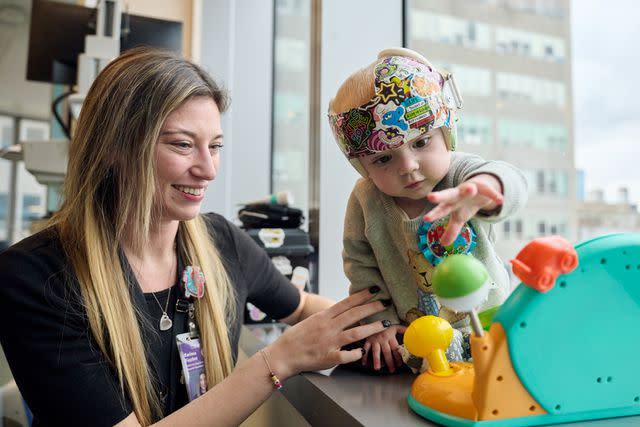
Joe Carrotta / Hassenfeld Children's Hospital at NYU Langone
A child life specialist plays with Nathaniel at Hassenfeld Children's Hospital at NYU Langone.“I was just full of love — full with love that I’ve never known before," says Grossman. I was so happy that he was born and he was alive… Even though I knew that he might die.”
After Nathaniel's arrival — he looked like a normal, healthy baby says Grossman — the newborn’s diagnosis was confirmed: His heart was failing and he needed a heart transplant to survive.
There are about 500 pediatric heart transplants in the US each year, according to the Pediatric Heart Transplant Society. The average wait time for an infant to receive a heart transplant in the New York City area is six to nine months.
“The hardest part is waiting,” says Dr. Rakesh Singh, 48, pediatric cardiologist and Medical Director of the NYU Langone Pediatric Heart Failure and Transplant Program. “Unfortunately, there just are not enough donor hearts available for small children, and they actually are the ones who die at the highest rate waiting for a heart.”
Doctors had to work to keep Nathaniel alive long enough to receive a donor heart.
“Many pediatric heart transplants are performed in the United States — what’s unique about Nathaniel Grossman is that we used a different strategy,” says Dr. T.K. Susheel Kumar, 49, surgical director of NYU Langone’s Pediatric Heart Failure and Transplant Program.
Normally when babies are born with severe heart failure and don’t stabilize with a ventilator and medications, an artificial heart machine, called a Berlin Heart, is used until they can receive a transplant. But that device carries significant risks, like bleeding, stroke, infection or death, according to Dr. Singh.
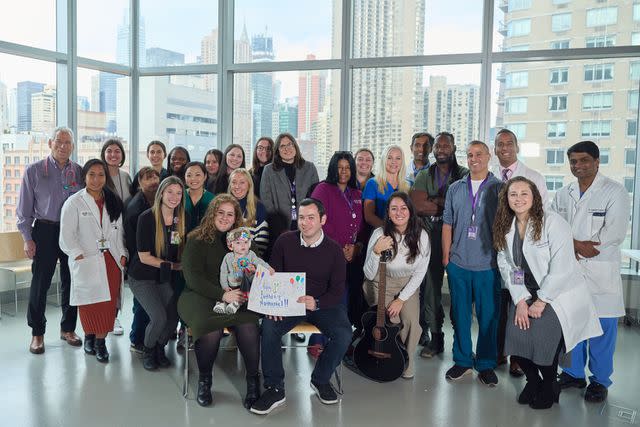
Joe Carrotta / Hassenfeld Children's Hospital at NYU Langone
Nathaniel's care team at Hassenfeld Children's Hospital at NYU LangoneRelated: Married Couple Met at Hospital Where Both Received Heart Transplants on Same Day: 'Felt a Spark'
The NYU team took a different approach by applying a new, hybrid procedure in which they used Nathaniel’s healthy right ventricle to move blood flow throughout his body to compensate for his failing left ventricle.
“I realized we could use the right heart to carry the left function,” Dr. Kumar says. “I felt it would be safer.”
As Nathaniel waited, he doubled in size. But he got sicker and his organs were shutting down, one by one, his mother says. The many medical procedures to keep him alive were hard to watch.
“Every day, it was a fight for his life,” Broyer says.
“Sometimes it was too much pain to see, but then he was smiling,” Grossman says. “In the hardest moments, he knew always to give me a smile.”
Nathaniel’s heart transplant was performed on June 16. “The heart started up right away,” Dr. Singh says. “It’s really amazing to watch. It’s like magic.”
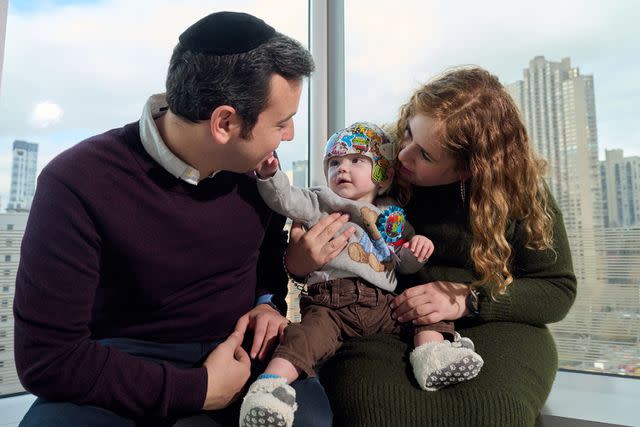
Joe Carrotta / Hassenfeld Childrenâs Hospital at NYU Langone
Nathaniel with his parents.It was the best day of his life, Broyer tells PEOPLE. The donor heart worked perfectly. After the transplant, Nathaniel made “rapid progress,” Dr. Kumar says. He was soon sitting up, smiling and interacting with nurses.
“He is quite remarkable,” Dr. Kumar says.
Nathaniel was discharged from the hospital on Aug. 25, and is now living in Brooklyn with his parents. They plan to stay in the U.S. at least until a year after his transplant so he can be close to his medical team.
Nathaniel is an infectiously happy baby who loves music and grabbing food off his mother’s plate, even though he still has a feeding tube.
“He is the most amazing boy,” Grossman says. “He’s a fighter. He’s very strong.”
On Wednesday, Nathaniel and his parents visited his hospital family to celebrate his first birthday. They hope that he can have a normal, healthy childhood. His prognosis is good, Dr. Singh says – the donor heart should last for more than 25 years. There is documentation of newborn heart transplant patients that are more than 40 years old.
“There is hope. Don’t give up,” Grossman says. “I know that he’s a miracle.”
For more People news, make sure to sign up for our newsletter!
Read the original article on People.

